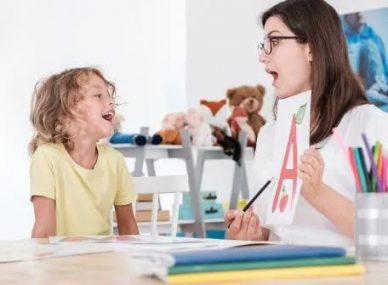Books! Books are colorful, elaborate, and filled with stories, pictures, alphabets, words, and much more. There are countless books available for babies, kids and even growing children. Despite the growing popularity of digital gadgets, books have never lost their value and never will. And the good part is, when used rightfully, books can even help in speech therapies. Sounds amazing, right?
Let’s Discover The Importance Of Books In Speech Therapy
Children may have various types of speech disorders such as stuttering, articulation errors, apraxia, dysarthria, selective mutism and more! As a parent, it can be a concerning matter when you see your child lack speech and language skills. Speech and language skills are important since they help all of us to communicate with each other as well as convey our messages and thoughts.
Sometimes, parents don’t have control over a situation. However, identifying the signs of speech and language impairments at the early stage is very crucial. And, consulting a speech and language specialist who offers tailored speech therapy for children often helps a kid overcome the difficulties with time.
Now, the question may arise: how do books play a part in speech therapy? Books can be a useful tool to nurture your child’s speech and language development. Even if you believe that your child may not be fully engaged in the story, reading to them can have remarkable benefits. It will enhance their language and literacy skills as well as expand their vocabulary and foster shared focus.
The beauty of books lies in their repetitive sentence patterns, which in turn help develop smooth speech patterns. Engaging a child with a rhyming book may promote a deepening awareness of sounds. When parents embrace books more and more, they can create a nurturing environment for their child’s growth and learning.
How To Use Books In Speech And Language Therapy For Your Kid
Acting It Out– This is such a simple yet effective way to engage kids and help them truly grasp the essence of a book. Whether the story or the plot is simple or complex, you have the freedom to make it as straightforward or intricate as you wish! You can use various voices to add an extra layer of excitement. Through this interactive approach, you can effortlessly work on grammar, verbs, speech sounds, etc.
Read To Your Child Every Day– Research has shown that reading to your child for 20 minutes a day has numerous benefits. If your child struggles to sit still for the entire duration, you can try reading a story aloud while they are engaged in another activity, like playing on the floor or taking a bath. Simply hearing the language, words, intonation, and story may support their speech and language development.
Choose Books Based On A Child’s Developmental Level – When selecting books, consider your child’s developmental level as well as preferences rather than focusing solely on their age. If your child has a shorter attention span, you can look for those books with vibrant pictures and fewer words per page. Children with special needs have their own set of preferences. You should make the reading time smoother for your child by choosing books that comply with their personal interests.
Talk About The Pictures: Engaging with the pictures in books can be a wonderful activity for expanding sentences and promoting early language development. What you can do is label and discuss what’s happening in the pictures. This opens up opportunities to work on various skills such as answering wh-questions, building vocabulary, describing, comparing and contrasting, practicing grammar and more.
Use Repetitive Books: Repetitive books are valuable and offer numerous advantages for language development. They provide a predictable structure that children can follow along with, fostering a sense of familiarity and confidence. Listening to repetitive stories helps children engage in the stories even more. They love to repeat after the words or character names and what will happen next. This can encourage children to initiate conversation.
Bottom Line
Books can definitely improve a child’s speech and language skills with time. However, it’s always recommended to look for the best speech therapy clinics in Dubai that work with compassionate speech therapists.
We at Hope AMC are dedicated to offering tailored therapies for various types of speech disorders in children in Dubai. After assessing the condition or difficulty level, we devise a speech therapy program for the kid. We always involve parents or caretakers in our speech therapy to help kids even at home.
Book a consultation with one of our experienced speech therapists today!






